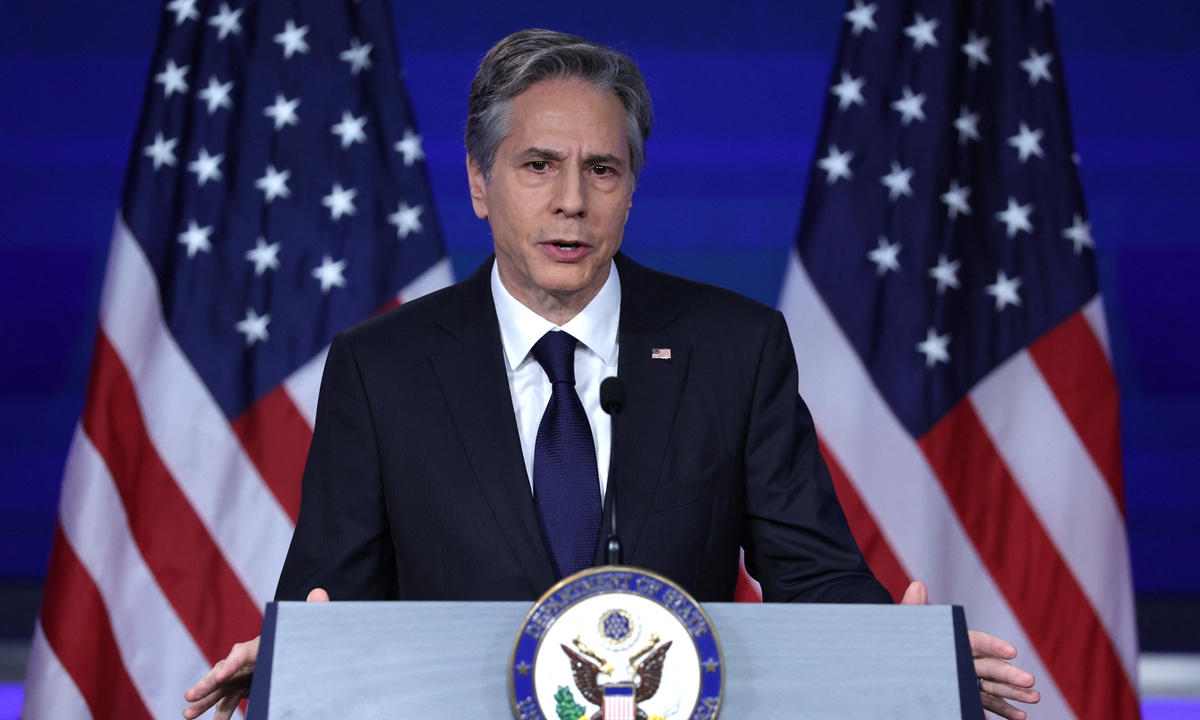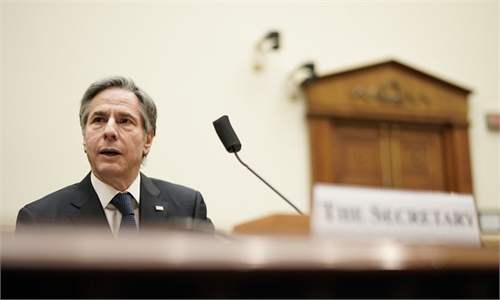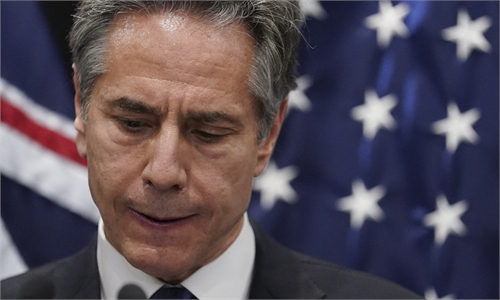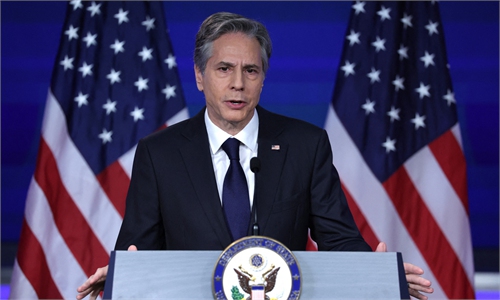
U.S. Secretary of State Antony Blinken speaks on China at Jack Morton Auditorium of George Washington University May 26, 2022 in Washington, DC. Photo: AFP
US Secretary of State Antony Blinken on Thursday gave a speech on US policy toward China at George Washington University. The speech was just a summary of old clichés to show the Biden administration's assertiveness to outcompete China while enhancing the campaign to stigmatize Beijing despite a seemingly softer rhetoric.In his speech, he said "We are not looking for conflict or a new Cold War. To the contrary, we're determined to avoid both." He also said that the US is ready to increase "the direct communication with Beijing across a full range of issues."
But no surprisingly, he described China as the "most serious long-term challenge to the international order," and said the US will compete with China to defend its interests and its vision for the future.
Chinese observers said it is clear from Blinken's speech that Biden administration's policy toward China is nothing new but a summary of what it has done in the past 15 months. The softer rhetoric showed the US' hypocrisy, and the essential nature of its China policy is still to compete with China in all fronts to contain it.
Blinken has strived to praise the US while sparing no efforts to demonize China in a bid to lay grounds for major power competition and the promotion of the Indo-Pacific Strategy, Diao Daming, associate professor at the Renmin University of China, told the Global Times.
Blinken underscored the policy "modeled on that inherited from the Trump administration" with an "overview of the strategy rather than details on its mechanics" as some media previously reported.
The Biden administration's policy toward China is based on Trump's in nature while the tactics are returning to Obama era's alignment - Biden's policy has resorted to the measures that were proven effective in the previous two presidency terms, Xu Liang, an associate professor at the School of International Relations of Beijing International Studies University, told the Global Times.
What Blinken said about the Taiwan question was also predicted by Chinese experts: it was putting out the fire set by President Joe Biden's "slip of the tongue." Nevertheless, Chinese experts noted this doesn't mean the US will adhere to the three China-US joint communiqués. The US has been trying to hollow out the core of the One-China principle.
Zhang Tengjun, deputy director of the Department for Asia-Pacific Studies at the China Institute of International Studies, told the Global Times that the trend of US deepening its ties with Taiwan island is growing. It is hard to predict the US' petty moves but what is certain is the US will provoke China-US ties on many occasions, Zhang said.
The US will let its relations with China continue to slide into an abyss. Although deteriorated ties with China have impacted US society, the Biden administration is determined to make its political goals of containing China, Zhang noted.
Historically, when a US president faced a similar crisis of approval, resorting to external problems to promote internal unity and save the approval ratings was the usual option.
Biden probably has a similar plan, but the situation in the US will prevent it from being delivered. The voters care more about domestic issues and the US is suffering serious inflation, a raging pandemic and huge economic challenge - which cannot be solved by attacking China while beautifying itself. If the Biden administration fans a flame with China-US relations but fails to put out the fire, it will be thrown into a more difficult position.
Global issues like climate change, pandemic fight and economic recovery won't be effectively addressed without China-US cooperation. And these issues also heavily affect US society. Both countries should respect the other's core concerns. For China, it is the Taiwan question. But the US carries on provocations and makes trouble to make it harder for the two countries to improve ties.
The strategic mutual trust between China and the US is fragile. This has led to the so-called comprehensive competition. If China-US ties continue to worsen, the tensions may get out of control and end up in conflict.
In this context, Chinese experts also noted that China needs to see through the nature of US rhetoric and avoid traps of words. Provocations against China's core interests must be resolutely countered. China has done much in this regard and should continue to make it clear to the US that China is a country walking the talk. As a well-known Chinese song goes: "For our friends, we have fine wine. For jackals or wolves, we welcome with shotguns."



